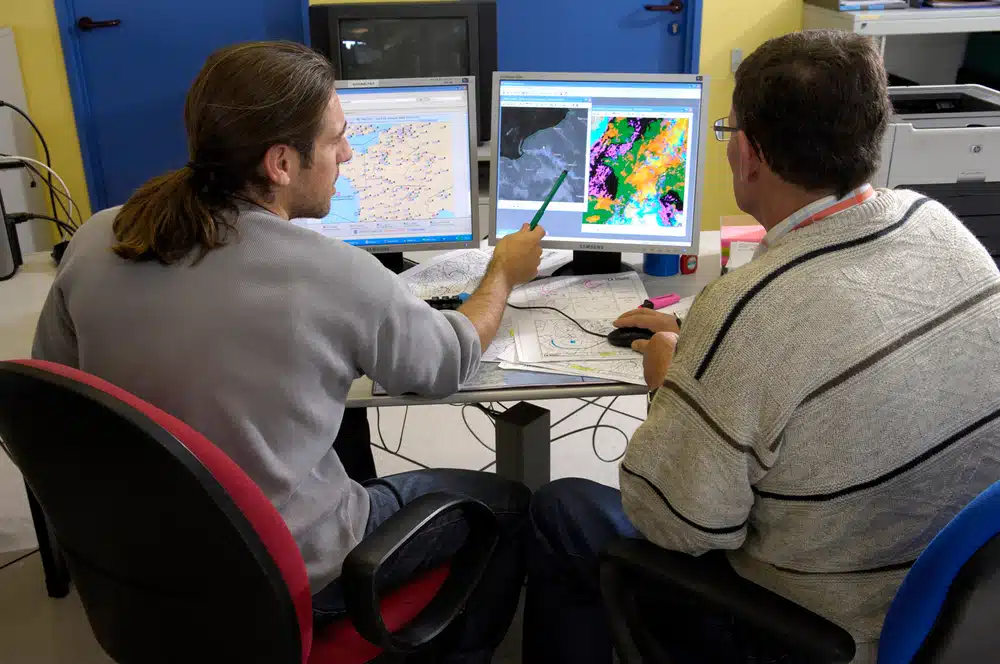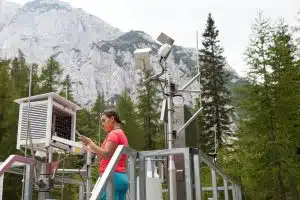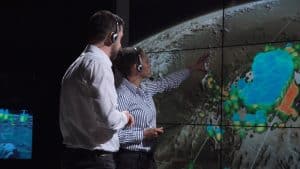A Comprehensive List of Meteorology Schools in the US
Studying the weather may seem like a daily routine activity for many people. However, beyond our rudimentary interaction with weather forecasts lies the complex and fascinating field of meteorology. In this article, we will explore different aspects of meteorology as a field of study and provide a comprehensive list of the top meteorology schools in the US.
Understanding Meteorology as a Field of Study
Meteorology, in a nutshell, is the scientific study of the atmosphere that focuses on weather processes and forecasting. This field of study goes beyond just predicting whether it’s going to rain or snow. Meteorologists play a crucial role in understanding climate patterns, forecasting natural disasters, and contributing to environmental protection efforts.
When it comes to understanding meteorology, it’s important to delve into the various aspects that make it such a fascinating field. Meteorologists study the weather phenomena that occur in the Earth’s atmosphere and explore the interactions between the atmosphere and other components of the Earth’s system, such as the oceans, land surfaces, and even space weather.
By studying these interactions, meteorologists gain insights into the complex processes that drive weather patterns and climate change. They analyze atmospheric conditions, such as temperature, humidity, and air pressure, to understand how they influence weather events like storms, heat waves, or droughts. This knowledge helps meteorologists develop accurate weather forecasts and provide early warnings for severe weather events.
The Importance of Meteorology
One cannot underestimate the importance of meteorology. It plays a key role in our daily lives and the global economy. Whether it’s helping farmers plan their crops around the weather, guiding pilots’ flight paths, or warning coastal towns of upcoming hurricanes, meteorologists serve as the frontline protectors against adverse weather conditions.
Moreover, in the era of climate change, the role of meteorologists is becoming even more vital. They contribute significantly to ongoing research and discussions related to climate change and its impacts. By studying long-term climate trends and analyzing historical weather data, meteorologists provide valuable insights into the Earth’s changing climate and help policymakers make informed decisions to mitigate its effects.
Furthermore, meteorologists also play a crucial role in environmental protection efforts. They monitor air quality, study atmospheric pollution, and assess the impact of human activities on the atmosphere. By understanding how pollutants disperse in the atmosphere and their effects on weather patterns, meteorologists contribute to the development of sustainable practices and policies that aim to reduce pollution and preserve the environment.
Key Skills for Meteorologists
The field of meteorology demands a wide array of skills. Apart from a strong background in general physics and mathematics, meteorologists also require specialized knowledge in areas like atmospheric physics and earth sciences. They delve into the intricacies of the Earth’s atmosphere, studying its composition, structure, and dynamics.
Moreover, they need to be proficient in using complex weather prediction models and compute-intensive applications. These models simulate the behavior of the atmosphere based on various inputs, such as temperature, humidity, wind patterns, and solar radiation. These models allow meteorologists to generate detailed forecasts and analyze different weather scenarios.
Strong communication skills are also a must for meteorologists. They often need to explain complex weather forecasts to a lay audience, report weather changes to the aviation and maritime industries, or contribute to scientific research papers. Effective communication ensures that the information provided by meteorologists is understood and utilized by various stakeholders, improving public safety and decision-making.
Additionally, meteorologists must possess critical thinking and problem-solving skills. They encounter complex weather phenomena and are constantly challenged to interpret and analyze vast amounts of data. By applying their analytical skills, meteorologists can identify patterns, detect anomalies, and make accurate predictions, ultimately contributing to the advancement of meteorological science.
Criteria for Choosing a Meteorology School
Finding the right meteorology school is crucial to setting a solid foundation for your career. While there are many factors to consider, we have narrowed the search to three key aspects: accreditation and reputation, course content and specializations, and opportunities for fieldwork.
Accreditation and Reputation
The first step towards choosing a meteorology school is to check its accreditation status. Accredited institutions meet certain academic standards set by external bodies, ensuring the quality of your education. Attending a school recognized by professional organizations such as the American Meteorological Society (AMS) or the National Weather Association (NWA) is important. These accreditations validate the institution’s commitment to excellence and provide you with networking opportunities and access to resources within the meteorology community.
In addition to accreditation, the reputation of the institution is also crucial. Schools with a strong reputation generally have experienced faculty, robust academic resources, and rich alumni networks. A reputable meteorology school often attracts top-notch professors who are experts in their respective fields. These professors provide quality instruction and serve as mentors and advisors, guiding students toward successful careers in meteorology.
Furthermore, a school’s reputation can also impact future job prospects. Employers in the meteorology industry often value graduates from well-known and respected institutions. A degree from a reputable meteorology school can give you a competitive edge in the job market and open doors to exciting opportunities.
Course Content and Specializations
The curriculum offered by any meteorology school is another important criterion. The course content should cover a broad spectrum of meteorology topics, including climatology, atmospheric dynamics, and remote sensing techniques. A well-rounded education in meteorology equips you with the necessary knowledge and skills to understand and predict weather patterns, climate change, and natural disasters.
Additionally, some schools offer specializations in areas like tropical meteorology and global climate modeling, which could further enhance your expertise in the field. Specializations allow you to delve deeper into specific areas of interest and develop a niche expertise that can set you apart from other meteorologists. Whether you are passionate about studying hurricanes or interested in analyzing climate data, a school that offers specialized courses can help you tailor your education to align with your career goals.
Moreover, it is important to consider the availability of advanced courses and research opportunities. Advanced courses allow you to explore complex meteorological concepts and engage in cutting-edge research. Research projects allow you to work closely with faculty members and contribute to the advancement of meteorological knowledge. Engaging in research not only enhances your understanding of the subject but also strengthens your analytical and problem-solving skills.
Opportunities for Field Work
While classroom learning is integral, hands-on fieldwork provides invaluable practical experience. Schools that offer opportunities for fieldwork, like internships at weather stations or research projects, allow students to apply their theoretical knowledge in real-world contexts. Fieldwork allows you to collect and analyze meteorological data, conduct experiments, and gain practical skills essential for a successful career in meteorology.
Furthermore, fieldwork allows you to develop important professional skills such as teamwork, communication, and adaptability. Working in the field often involves collaborating with other meteorologists, scientists, and technicians, fostering camaraderie and networking opportunities. Fieldwork also exposes you to different weather conditions and geographical locations, broadening your understanding of meteorology and enabling you to adapt to various work environments.
Additionally, schools that have strong connections with government agencies, private companies, or research institutions can provide you with access to state-of-the-art equipment and facilities. These partnerships may also lead to job opportunities or research collaborations, further enhancing your career prospects.
When choosing a meteorology school, it is important to consider factors such as accreditation and reputation, course content and specializations, and opportunities for fieldwork. By carefully evaluating these criteria, you can select a school that provides a quality education and offers the resources and experiences necessary for a successful career in meteorology.
Overview of Top Meteorology Schools in the US
American universities offer some of the best meteorology programs in the world. Whether you prefer the close-knit community of a small college or the diversity and dynamism of a large public university, there’s a meteorology school for you.
Studying meteorology in the United States provides students with a unique opportunity to learn from renowned experts in the field and gain hands-on experience through state-of-the-art research facilities. The country’s top meteorology programs offer a comprehensive curriculum that covers a wide range of topics, from atmospheric dynamics to climate change.
Cornell University
It should come as no surprise that Cornell University is at the top of this list. Not only is it the only Ivy League university included on this list, but it is also the only Ivy League institution that offers a major in atmospheric sciences.
The university provides all of the amenities that one would anticipate from an institution of its standing, such as access to a variety of resources, one of which is the Northeast Regional Climate Center. The center is supported financially by the National Oceanic and Atmospheric Administration, and it collaborates with the National Climatic Data Center, the National Weather Service, and other organizations in order to collect data on and keep track of changes in the atmosphere in the northeast.
The majors offered by the College at Cornell are characterized by their intimate classroom settings, which provide students with exceptional opportunities to collaborate directly with teachers. Students develop close relationships with their lecturers, giving them access to a wealth of knowledge and opportunities to participate in research initiatives. But don’t let its outstanding quality deceive you. The Department of Earth and Atmospheric Sciences at Cornell University works in collaboration with the State University of New York system.
Ohio State University
Second on our list of meteorology schools in the US to consider is Ohio State University. The study of meteorology at this university presents students with challenges beyond those in the classroom.
The actions that the students carry out within their Meteorology Club provide tangible evidence of the passion that they hold for the subject. The club recently hosted its 25th Annual Severe Weather Symposium, where they invited specialists from all over the world, including former students and faculty members of the institution. Members collaborated to move their studies ahead by sharing their findings and research projects and working together to do so.
The club is essential in ensuring the program remains on the cutting edge. Over the course of many years, the advocacy efforts of the club have made it possible for the department to acquire new resources, such as a system of solar-powered instruments and data logger technology.
University of California, Davis
The program in Atmospheric Science at the University of California, Davis, features small class sizes and increased opportunities for interaction with faculty members. This program is housed in the College of Agricultural and Environmental Science and is a part of the Department of Land, Air, and Water Resources.
Students conduct observations, use specialized instruments, develop advanced theoretical frameworks, and construct models while closely supervised by teachers and mentors.
Students in the program collaborate closely with scientists from various disciplines to identify new lines of investigation, which fosters thoughtful and innovative students.
The efforts put in by these students have been acknowledged by professional organizations such as the American Meteorological Society (AMS). Because of their work investigating climate change and climate variability’s impact on ozone pollution, undergraduate researchers participating in the program were awarded two of the six scholarships made available by the American Meteorological Society (AMS).
In addition, students at Davis have the opportunity to participate in initiatives such as the Extreme Weather group. The group members do research on various severe weather phenomena, including extratropical and tropical cyclones, atmospheric blocks, and other phenomena. They investigate the possibility of socioeconomic damage caused by the events in question.
University of Georgia
In spite of the fact that the University of Georgia’s major in atmospheric sciences is a relatively recent addition to the list of meteorology schools in the US, it has already distinguished itself as being among the very best in the United States. This new major in atmospheric sciences better satisfies the requirements of potential employers in the field, building on the school’s prior success with its undergraduate certificate in atmospheric sciences.
The major has satisfied the American Meteorological Society’s requirements, which now emphasizes research and features a more comprehensive set of courses.
Because of this modification, the new curriculum is ideally suited for individuals interested in pursuing a career in meteorology. This degree satisfies the qualifications set forth by the federal government for employment in the public service as a meteorologist and the educational prerequisites necessary to become a Certified Broadcast Meteorologist.
Graduates of the curriculum can be found working in a variety of fields, including broadcast television, the National Weather Service, disaster management, the energy and utilities industries, and more.
University of Miami
Students at the Rosensteil School of Marine and Atmospheric Sciences at the University of Miami can work on projects at the forefront of their fields of study at the Department of Atmospheric Sciences. The Rosensteil School allows its pupils to participate in innovative research initiatives, taking advantage of the fact that it is situated in an area known for having particularly interesting weather.
These projects include the atmospheric chemistry group, which works to understand how gases and particles affect our climate and air quality.
Participants in the group travel to various environments, such as woods, urban areas, high-latitude oceans, and others, to collect readings and measurements, which they then use to study the impact of atmospheric chemistry on human health and the climate.
Cloud processes are being investigated by the scientists participating in the program, with a focus on the consequences of how these processes interact with one another and with radiation. As a result of their work at the Cloud-Aerosol-Rain-Observatory in the south of Florida, these scientists have developed a deeper comprehension of how pollution and smoking influence air quality and climate.
University of Michigan, Ann Arbor
Science-driven engineering at its best!” This is how the Climate and Space Sciences Engineering department at the University of Michigan at Ann Arbor promotes itself to prospective students. This is a bold claim, but one that is supported by their exceptional meteorology program.
Since its inception in 1954, this program has emphasized research, instructing students in the principles of science while fostering innovation to match more contemporary discoveries. This illustrious tradition is still upheld at the institution today.
Major studies include theoretical and modeling work, which establish techniques to track ocean waves and currents, as well as the impact of naturally occurring and man-made aerosols on climate, and a variety of other topics.
The teaching staff and the student body conduct joint investigations into the chemistry of the lower atmosphere and the overall air quality. They work together to develop novel methods of sensing climate change, including devices and chemical chains.
University of South Alabama
The University of South Alabama’s curriculum provides students with all of the essential academic training, but it also strongly emphasizes operational and applied meteorology. Many students pursue graduate degrees.
Students receive preparation for the job market through real-time forecasts as well as real-world experience. They have the opportunity to intern at the fully functional weather company located on the site, the Coastal Weather Research Center.
The cutting-edge broadcast studio at the institution uses the same professional broadcast meteorology software utilized by several television stations. Over the past 15 years, students majoring in broadcasting have had a successful record of getting jobs that are greater than 93%.
The institution provides a wide variety of extracurricular activities, such as possibilities for research, fieldwork within our network of professional-quality weather stations, and educational outreach to the local community.
University of Wisconsin, Madison
The Atmospheric and Oceanic Sciences Department at the University of Wisconsin, Madison, has achieved a level of quality that is unparalleled in its field because of the department’s faculty, which consists of 18 professors who are experts in a wide range of fields, including climate sciences, weather systems, and more.
In addition to gaining a grasp of the atmosphere and ocean in order to make accurate forecasts of the weather, students and faculty members are exposed to some of the most significant challenges facing our society today.
Participants in the program investigate the chemistry of the air, as well as the radiation from the sun and the earth, clouds, precipitation, and other environmental factors that have an impact on our standard of living.
The accomplishments of the school’s various programs and projects contributed, at least in part, to the institution’s overall success. Recent events led to the institution’s selection as a partner community for the Bridge Program run by the American Geophysical Union. With these resources, the program will be able to continue to recruit people of underrepresented populations and keep them in the program.
Final Thoughts
Whether you dream of predicting the next big thunderstorm or contributing to global climate studies, a degree in meteorology can certainly take you places. And the first step towards that journey is finding the right school. With this comprehensive list, you’re off to a great start!
If you need help putting the finishing touches on your college applications, at AdmissionSight, we have over 10 years of experience guiding students through the competitive admissions process.
AdmissionSight can help you put your best foot forward when applying to college this fall. Contact us today for more information on our services.










































